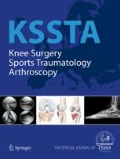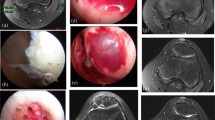Abstract
In this study we describe the potential role of autologous platelet gel and fibrin sealant in unilateral total knee arthroplasty to improve the postoperative range of motion and to reduce the incidence of arthrofibrosis. Total knee arthroplasty is often associated with a considerable amount of post-operative blood loss. Persistent limited motion directly after surgery may ultimately result in arthrofibrosis. To counteract these effects we investigated whether the use of autologous derived platelet gel and fibrin sealant would reduce postoperative blood loss, decrease the impaired range of motion and the incidence of arthrofibrosis. All patients were consecutively operated and assigned to the study or control groups. Study group patients (n = 85) were treated with the application of autologous platelet gel and fibrin sealant at the end of surgery. Eighty patients were operated without the use of platelet gel and fibrin sealant, and served as the control group. The postoperative hemoglobin decrease, range of motion and length of hospitalization were recorded. During a 5-month postoperative period patients were followed to observe the incidence of arthrofibrosis. In patients in the treatment group the hemoglobin concentration in blood decreased significantly less when compared to the control group. They also showed a superior postoperative range of motion when compared to those of the control group (P < 0.001). The incidence of arthrofibrosis and subsequent forced manipulation was significantly less (P < 0.001) in patients managed with platelet gel and fibrin sealant. We conclude that peri-operatively applied platelet gel and fibrin sealant may improve the range of motion after total knee arthroplasty, decreases the length of stay and may reduce the incidence of arthrofibrosis.




Similar content being viewed by others
References
Anitua E, Andia I, Sanchez M et al (2005) Autologous preparations rich in growth factors promote proliferation and induce VEGF and HGF production by human tendon cells in culture. J Orthop Res 23:281–286
Aspenberg P, Virchenko O (2004) Platelet concentrate injection improves Achilles tendon repair in rats. Acta Orthop Scand 75:93–99
Bierbaum BE, Callaghan JJ, Galante JO, Rubash HE, Tooms RE, Welch RB (1999) An analysis of blood management in patients having a total hip or knee arthroplasty. J Bone Joint Surg Am 81:2–10
Christensen CP, Crawford JJ, Olin MD, Vall TP (2002) Revision of stiff total knee arthroplasty. J Arthroplasty 17:409–415
Crovetti G, Martinelli G, Issi M et al (2004) Platelet gel for healing cutaneous chronic wounds. Transfus Apher Sci 30:145–151
Dennis DA (1997) Wound complications in total knee arthroplasty. Instr Course Lect 46:165–169
Everts PAM, Devilee RJJ, Brown-Mahoney C et al (2006) Platelet gel and fibrin sealant reduce allogenic blood transfusions and in total knee arthroplasty. Acta Anaesthesiol Scand 50:593–599
Everts PAM, Hoffmann JJHL, Weibrich G et al (2006) Autologous platelet gel growth factor release and leukocyte kinetics using three devices. Transfus Med 16:363–368
Gandhi A, Dumas C, O’Conner JP, Parsons JR, Lin SS (2006) The effects of local platelet delivery on diabetic fracture healing. Bone 38:540–546
Gardner MJ, Demetrakopoulos D, Klepchick PR, Mooar PA (2006) The efficacy of autologous platelet gel in pain control and blood loss in total knee arthroplasty. Int Orthop. doi: 10.1007/s00264–006–0174-z
Gollwitzer H, Burgkart R, Diehl P, Gradinger R, Buhren V (2006) Therapy of arthrofibrosis after total knee arthroplasty. Orthopade 35:143–152
Jahoda AE, Albala DM, Dries DJ, Kovacs EJ (1999) Fibrin sealant inhibits connective tissue deposition in a murine model of peritoneal adhesion formation. Surgery 125:53–59
Jones ME, Burnett S, Southgate A, Sibbons P, Grobbelaar AO, Green CJ (2002) The role of human-derived fibrin sealant in the reduction of postoperative flexor tendon adhesion formation in rabbits. J Hand Surg (Br) 27:278–282
Jordan LR, Olivo JL (1999) Stiffness and limitation of motion; prevention and management. In: Lotke PA, Garino JP (eds) Revision total knee arthroplasty. Lippencott-Raven, Philadelphia, pp 461–467
Kevy SV, Jacobson MS (2004) Comparison of methods for point of care preparation of autologous platelet gel. J Extra Corpor Technol 36:28–35
Khuri AI, Mathew T, Nel DG (1994) A test to determine closeness of multivariate Satterthwaite’s approximation. J Multivariate Anal 51(1):201–209
Kim J, Nelson CH, Lotke PA (2004) Stiffness after total knee arthroplasty. J Bone Joint Surg Am 86:1479–1484
Levy O, Martinowitz U, Oran A, Tauber C, Horoszowski H (1999) The use of fibrin tissue adhesive to reduce blood loss and the need for blood transfusion after total knee arthroplasty: a prospective, randomized, multicenter study. J Bone Joint Surg 81:1580–1588
Maloney WJ (2002) The stiff total knee arthroplasty: evaluation and management. J Arthroplasty 17(4 suppl1):71–73
Margolis DJ, Kantor J, Santanna J, Strom BL, Berlin JA (2001) Effectiveness of platelet releasate for the treatment of diabetic neuropathic foot ulcers. Diabetes Care 24:483–488
Marx RE, Carlson ER, Eichstaedt RM et al (1998) Platelet-rich-plasma: growth factor enhancement for bone grafts. Oral Surg Oral Med Oral Pathol Oral Radiol Endod 85:638–646
Mattingly PC, Bentley G, Cohen ML et al (1977) Preliminary experience with the geomedic total knee replacement. Rheumatol Rehabil 16:241–247
Nicholls DW, Dorr LD (1990) Revision surgery for stiff total knee arthroplasty. J Arthroplasty 5(suppl):S73–S77
Okuyama N, Wang CY, Rose EA et al (1999) Reduction of retrosternal and pericardial adhesions with rapidly resorbable polymer films. Ann Thorac Surg 68:913–918
Oz MC, Jeevanandam V, Smith CR et al (1992) Autologous fibrin glue from intraoperatively collected platelet-rich plasma. Ann Thorac Surg 53:530–531
Papagelopoulos PJ, Sim FH (1997) Limited range of motion after total knee arthroplasty: etiology, treatment, and prognosis. Orthopedics 20:1061–1067
Pham CT (2006) Neutrophil serine proteases: specific regulators of inflammation. Nat Rev Immunol 6:541–550
Ries MD, Badalamente M (2000) Arthrofibrosis after total knee arthroplasty. Clin Orthop Relat Res 380:177–183
Ritter MA, Campbell ED (1987) Effect of range of motion on the success of a total knee arthroplasty. J Arthroplasty 2:95–97
Schlag G, Redl H (1988) Fibrin sealant in orthopaedic surgery. Clin Orthop 227:269–285
Schliephake H (2002) Bone growth factors in maxillofacial skeletal reconstruction. Int J Oral Maxillofac Surg 31:469–484
Scranton PE Jr (2001) Management of knee pain and stiffness after total knee arthroplasty. J Arthroplasty 16:428–435
Sheppard BB, De Virgillio C, Bleiweis M, Milliken JC, Robertson JM (1993) Inhibition of intra-abdominal adhesions: fibrin glue in a long term model. Am Surg 59:786–790
Slater M, Patava J, Kingham K, Mason RS (1995) Involvement of platelets in stimulating osteogenic activity. J Orthop Res 13:655–663
Takeuchi H, Toyonari Y, Mitsuhashi N, Kuwabara Y (1997) Effects of fibrin glue on post surgical adhesions after uterine or ovarian surgery in rats. J Obstet Gynaecol Res 23:479–484
Tawes RL, Sydorak GR, DuVall TB (1994) Autologous fibrin glue: the last step in operative hemostasis. Am J Surg 168:120–122
Thiede MA, Smock SL, Petersen DN, Grasser WA, Nishimoto SK, Thompson DD (1993) Production of osteocalcin by platelets: a potentially important link of platelet action in bone turnover. J Bone Miner Res 8:S147–S151
Toosie K, Gallego K, Stabile BE et al (2000) Fibrin glue reduces intra abdominal adhesions to synthetic mesh in a rat ventral hernia model. Am Surg 66:41–45
de Virgillio C, Elbassir M, Hidalgo (1999) Fibrin glue reduces the severity of intra-abdominal adhesions in a rat model. Am J Surg 178:577–580
Wang GJ, Hungerford DS, Savory CG et al (2001) Use of fibrin sealant to reduce bloody drainage and haemoglobin loss after total knee arthroplasty. J Bone Joint Surg Am 83:1503–1505
Weis AP, Krackow KA (1993) Persistant wound drainage after primary total knee arthroplasty. J Arthroplasty 8:285–289
Yamada Y, Ueda M, Naiki T, Takahashi M, Hata K, Nagasaka T (2004) Autogenous injectable bone for regeneration with mesenchymal stem cells and platelet rich plasma; tissue-engineered bone regeneration. Tissue Eng 10:955–964
Author information
Authors and Affiliations
Corresponding author
Rights and permissions
About this article
Cite this article
Everts, P.A.M., Devilee, R.J.J., Oosterbos, C.J.M. et al. Autologous platelet gel and fibrin sealant enhance the efficacy of total knee arthroplasty: improved range of motion, decreased length of stay and a reduced incidence of arthrofibrosis. Knee Surg Sports Traumatol Arthr 15, 888–894 (2007). https://doi.org/10.1007/s00167-007-0296-x
Received:
Accepted:
Published:
Issue Date:
DOI: https://doi.org/10.1007/s00167-007-0296-x




